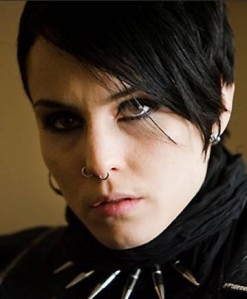This is like the third article I’ve seen about Angelina Jolie in Salt, in a role originally written for Tom Cruise: Angelina Jolie embodies today’s action heroine, in life and on-screen. Yet again, someone manages to string together 500-or-so breathless words about Women in Action without mentioning Lisbeth Salander or her onscreen representation, Noomi Rapace.

Granted, the Swedish film version of the Milennium movies has not reached the heights of popularity scaled by Stieg Larsson’s books, or at least not in America. But it struck me how much of what is true about Jolie is true about Larsson’s femme fatale. For example:
Di Bonaventura compares Jolie to Steve McQueen in the way she combines her athleticism and acting ability: “Steve McQueen wasn’t a big guy. She’s not a big girl. He wasn’t pumped up. She’s not pumped up. But you believed Steve McQueen was going to kick whoever’s ass it was. And you believe she can kick whoever’s ass it is. And that’s attitude, not physicality.”
Exactly. And it’s attitude that makes Lisbeth Salander one of the most compelling characters in popular literature. Cooler than Alice, hotter than Dorothy (and with no home to get back to), Salander — antisocial, bisexual, moody, brainy, and rough around the edges — represents an important shift of how we think about heroines, and women in general.
The fact that Americans can not only stomach a protagonist who could not be less interested in pleasing men, but, in fact, clamor for more is telling. Her popularity means that we shouldn’t be so shocked that Angelina Jolie can play a Russian spy; we should be shocked when people try to give us limited and dated notions of what audiences will and won’t accept.
The most-repeated anecdote about the making of Salt is that after the character Edwin became Evelyn, not much changed in the script — except that where Edwin was supposed to save his wife and children, director Phillip Noyce made Evelyn’s husband escape on his own so as not be emasculated. After he caught flak for that, Noyce claimed the original ending was changed because it was too “conventional.” I think the idea that no man’s pride can survive a woman’s helping him is too conventional, not to mention insulting.
One of the things I love about the Millenium trilogy is that various people do the saving: No one person is the hero. Lisbeth Salander is saved, saves herself, and saves her older male lover. His balls do not fall off in shame over his having been rescued by a girl. Perhaps this is because he is Swedish, but I choose to believe it’s because he is awesome.
In the same vein, anyone who is strong enough to play Angelina Jolie’s husband convincingly is strong enough to withstand being rescued by her.
